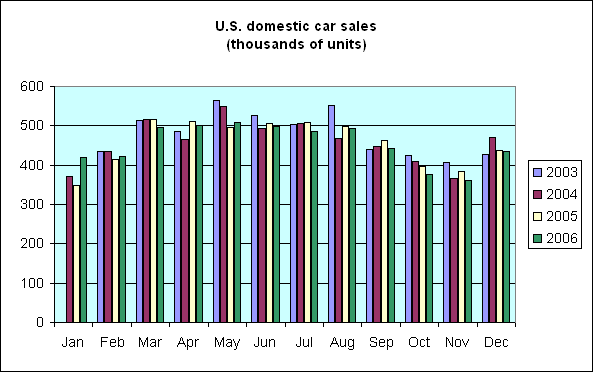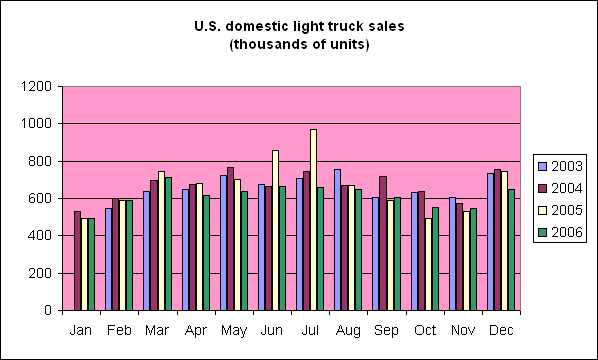Auto sales data released today look just great, as long as your name is Toyota.
The W$J reports that Toyota sold 12% more vehicles in December 2006 compared with December 2005, while GM and Ford were both down 13%. That’s an acceleration of a long-run trend which is going to make an unfavorable contribution to our current short-run problem of keeping U.S. GDP growth positive. Long-term issues aside, what matters for short-run GDP and employment is cars made in the U.S.
Sales of domestically manufactured cars were down 0.6% from December 2005. That’s enough to give 2006 the worst fourth-quarter performance for domestic car sales of the last four years.
< |
Domestic light trucks, the key money-maker for Detroit, plunged 13.2% from December 2005:
 |
And don’t forget how bad those 2005 numbers were with respect to which we’re making the comparison: motor vehicles and parts all by themselves contributed -1.5% to the 2005:Q4 reported real GDP growth rate, (see BEA Table 1.5.2), so last year’s sales are a depressingly low hurdle to fall below. The Michigan Business Activity Index compiled by Comerica Bank is now at its lowest level since the recession of 2001.
My perspective on this continues to be that if the problems were just confined to autos, the U.S. as a whole would be ok. But we also have plenty to worry about with the housing sector.
I still believe that the most likely outcome is for U.S. GDP growth to remain positive. But the prediction for the first half of 2007 of 2.5% GDP growth from the median W$J forecaster (discussed also by Macroblog and the Big Picture) strikes me as overoptimistic.
Technorati Tags: macroeconomics,
autos,
recession
I used to drive Fords and then I tried a Corolla. Bought a Lexus and a Sienna. Made here and in Japan. Bought Toyota stock. It’s a no brainer. (If yourname is Toyoda) check it out. Waiting to see how the big pickup made in Texas will perform and hold up. Toyota may very well eat some more lunches until the unionized workers start showing up sober and conscientious. Here in the West we hadn’t any choice but to accept Detroit debris, now we have a lot of choices. Sooner or later GM and Ford will stop lieing and get on the ball or go belly up.
What percentage of Toyota cars sold in the U.S. are built in the U.S. Toyota has seven assembly plants in North America that employ lots of North Americans. GDP calculations would be complicated by the fact that some of the components for assembly are manufactured overseas.
Unfortunately, recently Toyota has confined its expansion plans to Canada. There are two reasons. First, although they were initially attracted to the Southeast because of low taxes and wages, they found that the work force was woefully under-educated. Canadian workers require much less training. Second, the taxpayer-funded health care system in Canada makes Canadians about $5 per hour cheaper. Both of these factors could be addressed by better government policies, just the sort of things that the so-called “anti-globalists” have been harping about.
Yes the -1.5% drag on 2005q4 from autos put a real dent in the GDP number, but wasn’t that just a reflection of the incentivized sales that crowded the numbers into q3 –just like I think will repeat for 2006q4? So the ‘hit’ is more dramatic than the actual business: it’s noise we can understand in terms of a distressed auto industry. If we smoothed out q3 and q4 numbers, the hill and valley would be less disturbing.
So, I agree mostly, but fear the administration will also see this deterioration as an incentive to escalate the war in Iraq to postpone this recession for one that will be larger later.
You think 2.5% growth is overoptomistic? How about any growth this year is overoptomistic. Sample some other kool aid that shows Nov 06 truck tonnage down nearly 9% YoY from Nov 05. This is the second worst since the last recession. Since this represents nearly 70% of all durable goods moving around, it isn’t looking good. Corporate margins are being squeezed and the party is slowing ending. Grab another cold one and call a cab home.
Joseph, you don’t have the facts. Those comments about worker education were made by the president of the Canadian automotive parts association, not by Toyota. http://www.decaturdaily.com/decaturdaily/news/050708/toyota.shtml
Joseph,
As of today, Toyota is in the market for a new plant in North America, apparently without prejudice as regards north of south of the border. Either border, for that matter.
If it turns out to be between the borders, then our hosts concern about short-term growth problems is partly addressed, as Toyota boosts capital spending. Otherwise, there will be a slight uptick in imports, as Toyota supplants more US production with production from Canada or Mexico.
Joseph,
I wrote too soon. Now I see the WSJ says Toyota is looking in the southern US for a plant site. Tennessee, Arkansas, and North Carolina are being considered. 200k/year capacity to start production in 2009.
What is the real problem with US auto sales? Is it price? Is it quality?
kharris, the question is how many hundreds of millions of dollars in tax subsidies the winner will pay Toyota to compensate for the higher health costs of American workers. Does it make sense to take taxpayer dollars and pay them to corporations so that they will pay for worker heath care or would it be more efficient to use tax dollars to pay for universal heath care directly?
“What is the real problem with US auto sales? Is it price? Is it quality?”
It’s quality. We don’t even look at Detroit cars anymore. We feel very sad about that, as we grew up in Detroit and still have relatives in the industry, but the quality difference is too great.
The Japanese manufacturers have been capturing market share for 35 years. There isn’t any one reason, except possibly the stunning managerial incompetence of the US auto makers managements.
However, the primary reason for the relative collapse of US-manufactured auto sales in the recent past is clearly the fact that US companies got (and get) a much higher percentage of their sales from trucks, and have put relatively little effort into their cars, especially their smaller cars. The shift in demand from larger to smaller vehicles is not something the US companies were prepared for.
Since the US makers had a very similar problem in the 70s, normal corporate managers would probably not have let it happen again, but these managers did. Back in the 70’s, even though they were wrong-footed, Ford and GM had superior financial and marketing capabilities and were able to regain substantial profitablity. They no longer have those advantages, and the market is even more competitive, so it will be interesting to see if they are able to avoid bankruptcy. I have some hope that the new Ford CEO understands what needs to be done. I have no such hope about the GM management.
If is hard for me to believe that incompetent management would be isolated to the US auto makers and not other industries. If there is incompetence it would seem to center on government intervention rather than management.
I agree that quality and cost are problems but haven’t we been through this with steel and other manufacturing? It would seem that there is something structural in our economy that is causing these problems and most of the analysis I have seen once again points back to government intervention. Are we destined to continue to lose market share because of government incompetence? And even though those in government are generally unqualified to run a business they continue to accumulate more and more influence in business decisions (note Sarbanes-Oxley, SCOTUS Kelo decision).
And complicit in this move toward central planning is the current economics profession. With the advent of Keynesian central planning, floating currencies, and general economic socialism and Fascism in our schools of economics is there any way out?
DickF,
You may be suffering from confirmation bias. Japan’s government is, as I understand it, more prone to intervene in economic matters than is the US government. Looking at just US government when evaluating the relative success of the US auto sector would lead to mistaken conclusions.
It is pretty clear that the structure of the US economy, in which large private firms took on the responsibility for worker health insurance, had a lot to do with the situation in which US auto makers (steel companies, airlines,…) find themselves. There was also, however, a purely private element. You argue that bad management is not likely to have been isolated to the auto sector, but circumstances in the auto sector may have been different enough from those in the wider economy to produce incentives for bad management. It is pretty clear, for instance, that Big 3 managers in past decades traded retirement obligations now for wages back then. That made their own results better, the results of today’s Big 3 managers worse. That is not isolated to the auto sector, but bad performance and problems with retirement obligations are not isolated to the auto sector, either.
Certainly, you can argue that tax policy long ago encouraged managers to substitute health care and pensions for wages, but the decision was still made by private managers. The result was foreseeable.
The issues facing the U.S. companies are legion:
1. cost structure is too high; union labor contracts were based on concern about keeping production going rather than good, long-term business acumen
2. organizational structure is too complex; redundant functions for production versus service, multiple design centers for brand, multiple design centers to service different countries.
3. management incentives favor suboptimization of the overall company; each manager focuses on his piece of the organization and his budget and his bonus to the detriment of the company results because “team” was only used for whipping subordinates, not for personal career and reward philosophy.
4. short-term profit approach to satisfy Wall Street rather than long-term strategic approach to strenthen product competitiveness.
5. faddism; jumping from one “hot” approach to another without any particular change in organization, management, or reward to support the latest fad.
6. government antagonism; bureaucrats made “points” for fighting with U.S. auto industry rather than working toward common goals… as opposed to Japan, China, Korea approach of support and even manipulation to advance auto industries in those countries.
7. loss of focus; Jacques Nasser was the ultimate example of a “leader” that forgot what the business was all about and took a massive cash trove and literally squandered it on projects like junk yard acquistion… as well as replacing people who knew the business with those who had no real automotive background to support his off-center ventures.
Other than that, it is interesting to note that J.D. Power quality survey rates the Ford Fusion higher than any Japanese model in its segment. Quality, the reason for buying Japanese, has been very well marketed by the Japanese, but perception may not be reality.
Hello guys where i can read more about this topic?
of course i know about http://google.com , but can someone derect me with links?
bye
Who says we have to buy cars all the time? WHY are we being bombarded with STUPID car commercials?? I have no reason to buy a new car (a horrible experience anyway) because my 12 year old car runs PERFECTLY FINE and gets 32 MPG around town.
To ask whats wrong US car sales suggests that it MUST be too low for someone’s liking. Did anyone ever think that maybe people either cant stand the cars, the AMOUNT OF commercials, or plain old just dont NEED a new car?